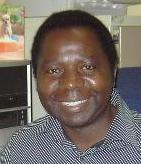
Associate Professor Ron Simango from Rhodes Linguistics spoke on SAFM on Sunday 19 February about the threat of language endangerment: the possibility that languages may die out and be replaced by more 'powerful' languages. Fortunately, he said, our languages can be preserved if people use them in more domains of society.
Ron was speaking on SAFM's weekly 'Word of Mouth' programme, dedicated to language-related issues. He said that language endangerment is a problem, because languages are vehicles that transfer knowledge systems and culture. When a language is lost, those systems of knowledge and cultures can also be lost. Speakers of endangered languages also suffer when languages are lost, because they then need to compete for jobs and resources on an unequal footing with native speakers of the dominant languages they adopt as their own.
Ron said that people need to be educated about the value of their own languages. This can be done in schools, but in many places, schooling is done in the more dominant languages, rather than in children's home languages. This is true particularly in South Africa, where English is used as the medium of instruction in most schools. One big hurdle to overcome is that there are few teaching materials in South Africa's indigenous languages. Ron called for incentive schemes to be developed to encourage academics to translate materials into indigenous languages.
The programme ended on a positive note: languages are worth saving, and can be saved and developed if people have the will to use them in more contexts, from speaking them to their children at home to using them in the workplace.
